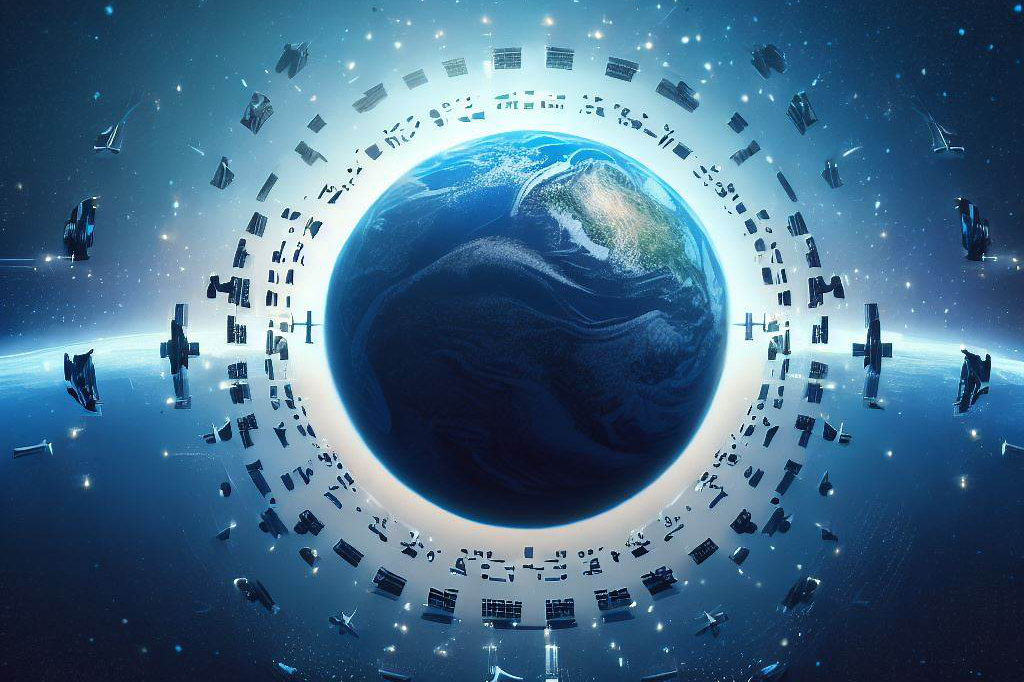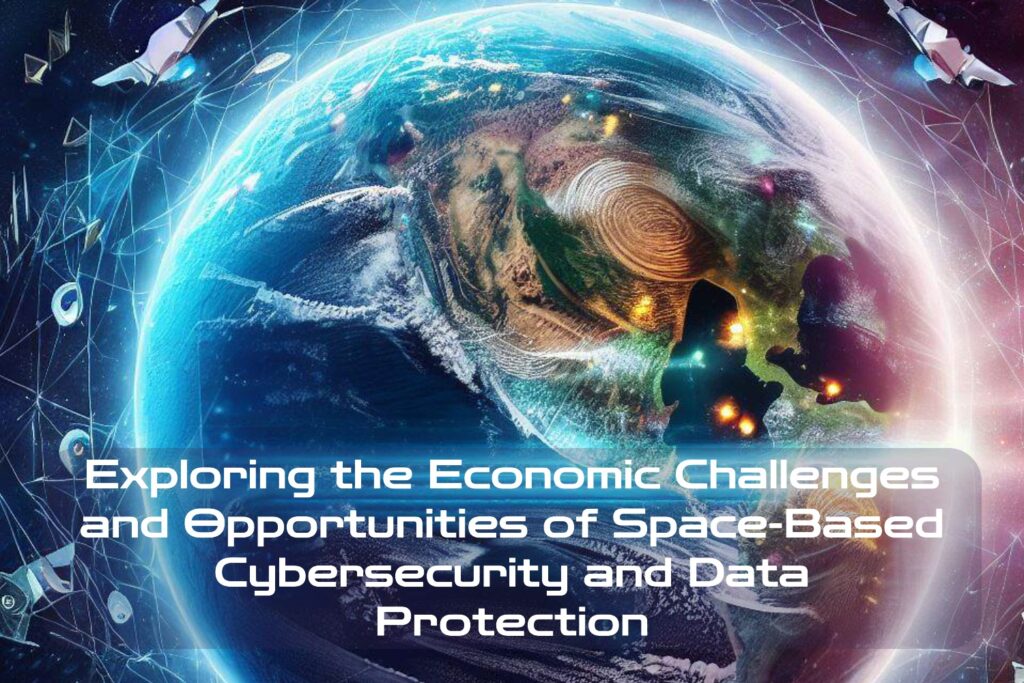The Importance of Cybersecurity and Data Protection in Space-Based Activities
Space-based activities are becoming increasingly important in our daily lives. Satellites are used for communication, navigation, weather monitoring, and even defense purposes.
However, these systems are vulnerable to cyberattacks that can compromise their functionality, disrupt communication channels, or even cause physical damage. The importance of cybersecurity and data protection in space-based activities cannot be overstated.
It is critical to ensure that satellites and other space-based systems are protected against cyber threats. Cybersecurity measures must be implemented to safeguard these systems from malicious activities such as hacking attempts, malware infections, or denial-of-service attacks.
The Economic Challenges
One of the biggest economic challenges facing the space industry is the high cost associated with developing and maintaining space-based cybersecurity systems. These costs include research and development expenses as well as ongoing maintenance expenses. Additionally, there is limited funding available for space exploration in general, which further complicates matters.
Another challenge is the competition among private companies for contracts and resources related to space-based cybersecurity. This competition can lead to a reduction in profits as well as increased pressure on companies to cut corners or take shortcuts with security measures.
The Economic Opportunities
There are also some significant economic opportunities that come with this field of work.
Firstly, there is an increased demand for cybersecurity professionals who specialize in the field of space-based security measures like spacecraft engineering or satellite design process control.
Additionally, there’s potential for new businesses to emerge in the field of space-based cybersecurity, such as private satellite operators working together with government institutions on joint projects aimed at developing new technologies designed specifically for securing these systems from cyber threats.
International collaboration on space-based cybersecurity initiatives offers opportunities for both economic growth through expansion into new markets but also greater knowledge sharing between different countries that tackle this global challenge together.
The Economic Challenges of Space-Based Cybersecurity and Data Protection
High Costs Associated with Developing and Maintaining Space-Based Cybersecurity Systems

Space-based cybersecurity systems are complex, expensive, and difficult to develop.
These systems must be highly specialized to protect against threats that are unique to the space environment.
This means that developers need a deep understanding of both cybersecurity and space technologies in order to create effective solutions. The costs associated with developing and maintaining these systems can be astronomical.
For example, a single satellite can cost hundreds of millions or even billions of dollars to build and launch into orbit. The cost of securing this satellite against cyber threats adds another layer of expense that must be factored in.
Limited Funding for Space Exploration and Research
Funding is always a challenge for space exploration and research, especially given the high costs associated with the industry. Because space-based cybersecurity is a relatively new field, it may not receive as much funding as other areas of space exploration. This lack of funding can impact innovation within the industry.
Without enough financial support, companies may struggle to develop new technologies or make significant advancements in existing ones. This could slow progress towards more effective space-based cybersecurity solutions.
Competition Among Private Companies for Contracts and Resources
Competition among private companies for contracts and resources can also pose an economic challenge for space-based cybersecurity initiatives. Private companies often have different agendas than government agencies or non-profit organizations, which means they may prioritize profits over security.
Additionally, the competitive nature of private industry may lead to duplication of efforts, as multiple companies work on similar projects at the same time. This could lead to wasted resources that could have been better spent elsewhere.
Overall, economic challenges should not deter efforts towards developing effective space-based cybersecurity systems. Instead, these challenges should be acknowledged so that stakeholders can work together towards finding solutions that are economically feasible and effective.
Economic Opportunities
Increased demand for cybersecurity professionals in the space industry

As the use of space-based technologies and systems increases, so does the need for cybersecurity professionals to protect them. This has led to a surge in demand for individuals with expertise in both cybersecurity and space technology. Many companies are offering competitive salaries and benefits packages to attract top talent.
In addition, government agencies such as NASA and the Department of Defense are investing more money into space-based cybersecurity research and development. This means that there will be even more job opportunities available in the field in the coming years.
Potential for new businesses to emerge in the field of space-based cybersecurity
With increased demand for space-based cybersecurity comes the potential for new businesses to emerge. Many startups are already entering this market, offering innovative solutions to protect against cyberattacks on satellites, spacecraft, and other systems.
These businesses have a unique opportunity to make a significant impact on the industry while also turning a profit. With limited competition, there is plenty of room for growth and expansion.
Possibility of international collaboration on space-based cybersecurity initiatives
Cybersecurity threats don’t discriminate based on nationality or geographic location. As such, there is great potential for international collaboration on space-based cybersecurity initiatives. Many countries have already expressed interest in working together to address these challenges.
For example, NASA has partnered with several international organizations including the European Space Agency (ESA) and Japan Aerospace Exploration Agency (JAXA) on various projects related to space exploration and research. By working together, countries can pool their resources and knowledge to develop more effective solutions that can better protect our shared interests in outer space.
Threats to Space-Based Systems

Space-based systems are exposed to a variety of threats that can compromise their cybersecurity and data protection.
The most common threat is intentional interference, which involves an attacker disrupting, disabling, or destroying a satellite’s normal operation.
This type of attack can be achieved by jamming or spoofing satellite signals, resulting in a communication blackout or loss of control.
Another threat is espionage, where attackers gain unauthorized access to sensitive information transmitted through space-based systems.
Espionage attacks are highly sophisticated and difficult to detect. They can involve the use of malware to infiltrate satellite systems and steal classified information.
Cyber attacks on ground-based infrastructure that supports space-based operations can also pose a serious threat. These attacks could include malicious software installed on computers used by mission control teams or hackers accessing monitoring stations for satellites.
Examples of past attacks on space-based systems

The 2007 Chinese anti-satellite missile test resulted in the destruction of one of their own weather satellites and created a significant amount of debris in orbit. This event demonstrated how nations could use physical force against satellites for military purposes.
In 2018, an Iranian hacking group was accused by the US government for attempting to breach aerospace companies involved in building and maintaining spacecraft for NASA.
The goal was likely espionage rather than physical disruption.
In 2021, China refused to provide details about an uncontrolled rocket falling back to Earth for fear they might reveal sensitive technology used in their space program.
Current Space-Based Cybersecurity Measures

Spacecraft manufacturers have developed several measures aimed at protecting against cyberattacks in space. Encryption technologies play an essential role because they make it challenging for attackers to intercept communications between spacecraft and ground stations.
Satellite operators rely on secure command links that require authentication at various levels before any instructions are executed onboard the spacecraft. Mission control centers have adopted air-gapping techniques that separate their computer networks from the Internet, making it difficult for cybercriminals to penetrate their systems.
Discussion on the effectiveness of these measures

Although these measures are useful, they may not be adequate to address all cyber threats faced by space-based systems. Spacecraft manufacturers and operators must continuously update their cybersecurity strategies to counter newer and more sophisticated attacks. One issue with current security measures is that they are highly reactive.
Cybersecurity professionals tend to focus on protecting against known threats rather than anticipating future ones. This approach can lead to vulnerabilities being overlooked until it is too late.
Another challenge is the limited ability of spacecraft manufacturers and operators to patch software vulnerabilities once a satellite has been launched into orbit. It can also be expensive, risky or impossible to send an engineer in space to perform upgrades or fixes.
Future Developments in Space-Based Cybersecurity

As technology advances, new opportunities emerge for improving cybersecurity in space-based activities. The following three technologies show promise:
Quantum Cryptography
Quantum cryptography uses quantum mechanics principles instead of classical computation methods for encryption key exchange. This method provides high levels of security against attacks, including those using quantum computing technology.
Artificial Intelligence (AI)
AI could assist in detecting anomalies within telemetry data transmitted by satellites and alerting mission control centers about potential breaches before any damage occurs. AI algorithms could also help improve automated response capabilities onboard spacecraft.
Blockchain Technology
Blockchain technology has the potential to make satellite communications more secure by providing immutable records of transmissions between ground stations and satellites. Blockchain can also reduce latency issues caused by long distances between communicating parties and provide secure supply chain management solutions with minimal human intervention.
While space-based cybersecurity presents challenges for economic development, emerging technologies offer new opportunities that could help overcome these obstacles in the years ahead. Space companies must remain vigilant about cybersecurity risks and adopt a proactive approach to protecting their assets.
Final Thoughts

After exploring the various economic challenges and opportunities associated with space-based cybersecurity and data protection, it is clear that this field presents both incredible potential and significant obstacles. On the one hand, there is a growing demand for cyber professionals in space, which opens up new possibilities for businesses to emerge in this industry.
On the other hand, high development costs and limited funding pose challenges that must be addressed. Throughout the article, we discussed current measures being taken to protect against space-based cyberattacks while also looking at emerging technologies that could improve cybersecurity in the future.
We also highlighted potential threats to space-based systems and delved into examples of past attacks on these systems. Overall, it is clear that space-based cybersecurity is a complex and evolving field with many moving parts.
Despite the challenges discussed in this article, there are still many reasons to be optimistic about the future of this industry. With continued collaboration between governments and private companies alike, we can work together to develop innovative solutions that will ensure our continued exploration and utilization of space for years to come.

C M, a seasoned editor, journalist, and consultant, is deeply fascinated by the convergence of technology, space, and the future of humanity.
With a particular interest in transhumanity, futurology, and the philosophical and ethical dimensions of these domains, C M serves as the lead contributor to SpaceSpotlight and TranscendSphere.
When not penning insightful articles on these rapidly evolving fields, C M indulges in their love for podcasts and books, proudly embracing their status as a ‘Happy Nerd Extraordinaire!’



